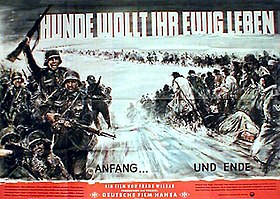Dogs, do you want to live forever
| Movie | |
|---|---|
| Original title | Dogs, do you want to live forever |
| Country of production | Germany |
| original language | German |
| Publishing year | 1959 |
| length | 93 minutes |
| Age rating | FSK 12 |
| Rod | |
| Director | Frank Wisbar |
| script |
Frank Wisbar Frank Dimen Heinz Schröter |
| production | Deutsche Film Hansa GmbH & Co. ( Alf Teichs ) |
| music | Herbert Windt |
| camera | Helmut Ashley |
| cut | Martha Dübber |
| occupation | |
| |
Dogs, do you want to live forever is a German film from 1959 directed by Frank Wisbar based on the novel of the same name by Fritz Wöss .
Origin of the title
The title is similar to that of the literary model by Fritz Wöss and is an allusion to a quote from Frederick the Great . During the Battle of Kolin , which Prussia lost to Austria, he is said to have called out to his fleeing soldiers in anger: "You cursed rascals, do you want to live forever?"
action
The young, National Socialist First Lieutenant Wisse was transferred to Stalingrad as a liaison officer to the Romanians in autumn 1942 . The German troops have conquered the city with great losses, but are already surrounded by the Red Army . Many of the common soldiers have realized that they are at the mercy of the enemy with no chance.
But because of the orders from "high above" the officers under General Paulus still believe in a victory. Thanks to Wisse fanaticism, an opponent's offensive can be beaten off again. But gradually he too recognizes the hopelessness of the situation. Major Linkmann only thinks about his own survival. While trying to desert he is shot by his own soldiers who watch him overflow.
The others, including knowledge, hold out to the bitter end. After the surrender, they march into a prisoner of war camp.
Production history
Wisbar's most famous work in Germany describes the Stalingrad basin . The focus of this film is on the brutality of military logic towards individuals and the rebellion of humanity against senseless decisions that consider people to be material to be worn out. The book by Fritz Wöss served as the namesake and formed the basis for the script that Frank Wisbar developed together with Frank Dimen and Heinz Schröter over a period of two years after detailed research and the evaluation of numerous documents.
From today's perspective, the film gets by with relatively modest means. The exterior shots, in which acts of war, e.g. B. tank battles or gun battles, are largely assembled archive material. All that was needed for the filming was a dummy tank that was mounted on a tractor. The fight scenes in the city itself are the result of studio recordings. Walter Haag was responsible for the award-winning studio backdrops, which were used for shooting. For the scenes with the wounded, Wisbar only used war invalids as authentic extras.
The film was shot in and near Göttingen . To emphasize its documentary character, the film had no credits. Instead, the cinema staff distributed slips of paper with their names to the visitors after the performance .
Reviews
- Lexicon of international film : “The attempt made with film funds to create an overall picture of the Stalingrad catastrophe in 1942/43. [...] On the whole, the director managed to move away from the dishonesty of the usual commercial war films of those years. "
- Reclam's Lexikon des Deutschen Films (1995): “Wisbar staged this well-cast Stalingrad drama with the usual technical sovereignty and let the characters themselves comment on the events in succinct, pessimistic sentences. As dramaturgically productive as this technique was, it was nevertheless unable to hide the fact that the directors and the scenarioists did not know how to classify the important topic socially and historically. "
- Evangelical film observer : “The tragedy of Stalingrad filmed with documentary authenticity and extraordinary creative power into a haunting appeal against the inhumanity and senselessness of modern war. Recommended for ages 14 and up. "
Awards
Awarded the German Film Prize in Gold for the entire film and the German Film Prize in Silver for direction and equipment.
literature
- Fritz Wöss : Dogs, do you want to live forever? Novel. Paul Zsolnay, Hamburg / Vienna 1958; New edition Tübingen 2017: ISBN 978-3-945796-82-5
Web links
- Dogs, do you want to live forever in the Internet Movie Database (English)
- Literature by and about dogs, do you want to live forever in the catalog of the German National Library
- Loosely based on Schiller . In: Der Spiegel . No. 16 , 1959, pp. 65-68 ( online ).
- Dogs, do you want to live forever at filmportal.de
- Film on YouTube
Individual evidence
- ↑ cf. u. a. Christopher Duffy: Frederick the Great. A soldier's life . Munich 2001.
- ↑ Freely adapted from Schiller . In: Der Spiegel . No. 16 16 April 1959 ( spiegel.de ).
- ↑ Dogs, do you want to live forever. In: Lexicon of International Films . Film service , accessed August 12, 2017 .
- ↑ Review No. 256/1959
